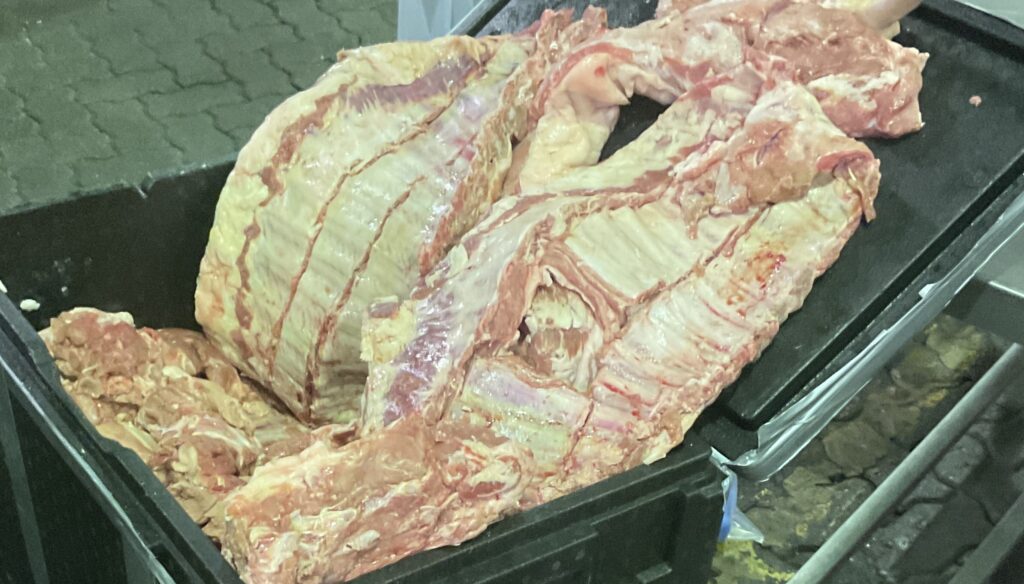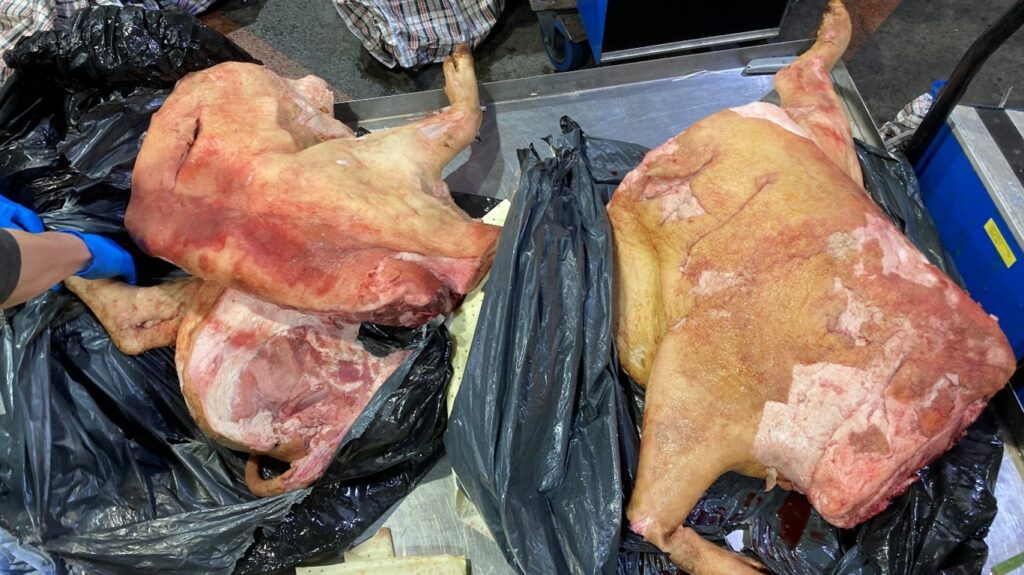UK farming and meat industry bodies are urging the government to act urgently to reinforce the UK’s border controls, following confirmation of foot-and-mouth in Germany.
The NPA has reiterated its calls for the government to properly fund checks on illegal meat imports of points of entry like Dover and to ensure the current ban on German livestock and meat imports is properly enforced.
The Association of Independent Meat Suppliers (AIMS) has gone a step further, calling for a ‘comprehensive ban’ on all personal imports of meat products derived from pigs and ruminants.
Wake-up call
NPA chief executive Lizzie Wilson said Germany’s foot-and-mouth outbreak should be a ‘massive wake-up call to government’.
“We have been living under the shadow of an African swine fever (ASF) outbreak for many years, and we now face the threat of a devastating FMD outbreak, as the virus circulates in a country that exports thousands of tonnes of pigmeat to the UK each year.
“We have learned over the past two years how criminal gangs are using the UK’s weak border controls to bring in products, unchecked, from regions where ASF is rife and from where exports are banned, including Romania. This is a disaster waiting to happen for the UK livestock sector.”
Germany exported more than 117,000 tonnes of pigmeat products to the UK in the first 10 months of 2024, including 61,000t of fresh or frozen pork and 38,000t of sausages, HMRC data shows.
Before Christmas, Dover Port Health Authority (DPHA) revealed that it had seized 147 tonnes of illegally imported meat since new rules designed to keep ASF out of the country were introduced in September 2022. This was despite DPHA staff only providing 20% operational coverage at the port, due to budgetary pressures, highlighting that the headline figure represents just the tip of the iceberg.
DPHA has been battling against cuts to its budget for this vital work for more than a year, and even though the current government initially indicated that this was a ‘priority’, the situation remains unresolved.
Ms Wilson said: “We urge the government to act now – and to work with DPHA and other key ports and airports to ensure they have the resources needed to keep potentially-infected meat and products of animal origin out of the UK and act as a proper deterrent to criminal gangs.”
She welcomed the government announcement that it has banned imports of live animals and meat products from Germany, but stressed that it is vital that these measures are now actively enforced.
“Germany’s domestic market is going to come under huge pressure, so some unscrupulous people might be seeking alternative markets, as has been the case in Romania. It is also important that the ban is properly communicated to the public,” she said.
She also called for the government carry out a proper review of the Border Target Operating Model (BTOM) for commercial imports, in light of evidence that large volumes of illegal meat imports are easily bypassing its formal checks.
“The relatively small cost of properly resourcing border checks at our ports pales into insignificance against the vast cost to our livestock industry and the taxpayer of an outbreak of a notifiable disease like FMD or ASF,” Ms Wilson said.
Personal import ban

AIMS has issued an ‘urgent call’ for the UK government to implement a comprehensive ban on all personal imports of meat products derived from pigs and ruminants.
“The recent outbreak of FMD has now led to the UK banning imports of live animals and meat and dairy products from Germany” said Dr Jason Aldiss, AIMS’s new executive director.
“However, personal imports of meat products continue to enter the country unchecked, particularly through our airports. This loophole presents a significant biosecurity risk, as both FMD and ASF viruses can survive in fresh and cured meat products for extended periods, remaining highly infectious”.
“UK airports have become critical points of vulnerability. The lack of stringent controls allows passengers to bring in meat products without adequate scrutiny. A single discarded ham sandwich in areas like the New Forest or the Forest of Dean, where wild boar populations are prevalent, could trigger a catastrophic outbreak”.
“Our own farming representatives and professional sources have indicated to us that the UK is woefully underprepared for an outbreak of this nature”.
Her pointed out that the 2001 FMD outbreak resulted in the slaughter of over 6 million animals and caused financial losses estimated at £8 billion which, in today, allowing for inflation over the last 24 years would be around £17 billion.
“For a Government that stresses the need for food security they need to Implement an immediate and comprehensive prohibition on all personal imports of meat products from pigs and ruminants, regardless of origin,” Dr Aldiss added.
“They must also invest in robust screening and enforcement measures at all UK entry points, be they ports, the channel tunnel and especially airports to prevent illegal meat imports. And allocate resources to bolster our preparedness and response capabilities against exotic animal diseases”.
Tracing
According to the Financial Times, Defra has told importers that while goods that had arrived in the UK from Germany since the virus was detected would be largely safe, UK authorities would aim to trace and remove products that originated close to the outbreak.
“Where these products have recently arrived in GB and the [health certificate] was signed in good faith before the presence of FMD in Germany was confirmed, we urge businesses not to put this product into the GB supply chain,” Defra said.
Peter Hardwick, policy adviser at the British Meat Processors Association, told the FT there was already a risk that FMD had spread beyond the area of the initial outbreak — and potentially beyond Germany.
“On that basis we should treat all movements from the EU as a potential risk and take precautions such as disinfectant mats at all points of entry including ports, airports, Channel Tunnel and Eurostar,” he said.
One British customs agent said the disease had been a risk since last Friday, but that Defra issued instructions to traders only on Tuesday.
“You have to worry about how much has already come in since last Friday,” the person said, adding that the UK’s current biosecurity arrangements were not sufficiently secure, the FT reported.




